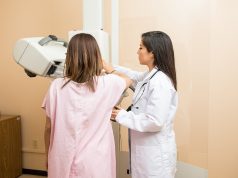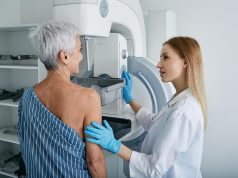Risk reduction surgeries before age 50 years substantially cut later cancer risk for those with genetic risk
By Lori Solomon HealthDay Reporter
THURSDAY, March 9, 2023 (HealthDay News) — The risk for cancer, including breast and ovarian cancer, remains high for women older than 50 years with genetic BRCA1 or BRCA2 mutations, according to a study published in the March 15 issue of Cancer.
Kelly A. Metcalfe, Ph.D., from Women’s College Hospital in Toronto, and colleagues estimated the cumulative risks for all cancers in women from 50 to 75 years of age with a BRCA1 or BRCA2 pathogenic variant. The analysis included 2,211 women seen at 85 centers in 16 countries who were followed until a diagnosis of cancer, death, age 75 years, or last follow-up.
The researchers found that 379 cancers were diagnosed in the cohort between 50 and 75 years of age. For any cancer, the actuarial risk was 49 percent for BRCA1 and 43 percent for BRCA2. The most frequent cancers were breast (186) and ovarian (45). The risk for developing any cancer between age 50 and 75 years was 9 percent for women who had both a risk-reducing mastectomy and bilateral salpingo-oophorectomy at younger than 50 years.
“We are not aware of whether the participants in our study received additional counseling about their elevated risk of cancer as they age and we are also unable to determine why some of these women chose to forgo preventative surgery before the age of 50,” Metcalfe said in a statement. “However, it is important to point out that screening alone only reduces mortality risk by increasing the chances of detecting the cancer early, it does not reduce the risk of cancer occurring.”
Several authors disclosed financial ties to the pharmaceutical and genetics industries.
Copyright © 2023 HealthDay. All rights reserved.








